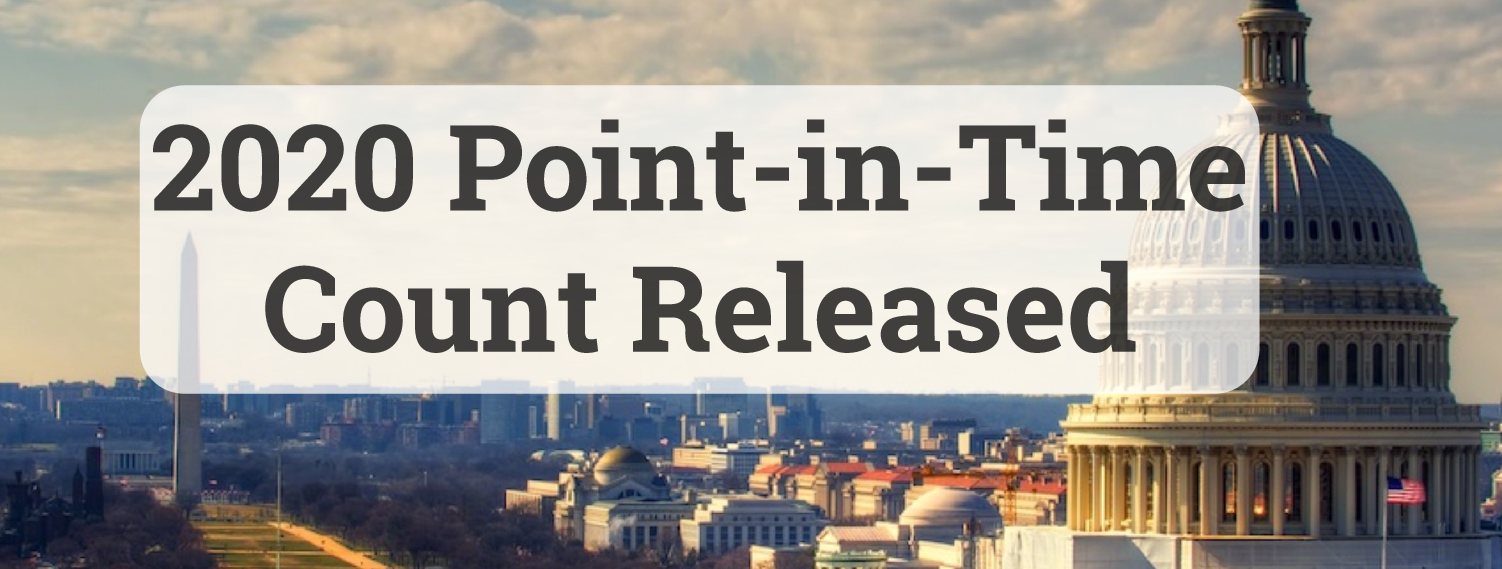2020 Point-in-Time Count Released
Last week, the city announced the results of the 2020 Point in Time (PIT) Count of Persons Experiencing Homelessness. The annual PIT report provides a one-night “snapshot” of the number of individuals and families staying either in shelter, temporary housing, or on the street in the DC region. Information collected informs city leaders, policymakers, and funders on emerging service needs and noticeable gaps in supportive services, and offers a guide for future program planning. This year’s count conducted on January 22, 2020, welcomed more than 300 volunteers who provided support—including a team lead by Everyone Home DC. It should be noted that the final report does not reflect the challenges of people experiencing homelessness due to the impact of the pandemic caused by coronavirus.
“As our city continues to face a public health crisis, it is clearer than ever that housing is health care. We must prioritize ensuring every person in the District has the right to a safe, affordable, and comfortable home,” Karen Cunningham, Everyone Home DC Executive Director, reflected after reviewing the full report. “We appreciate seeing that family homelessness continues to decrease—this year by 5.8 percent—and that the number of individuals experiencing chronic homelessness* decreased by 2.7 percent since last year. These results do reflect the impact of the District’s prioritization of individuals and families living in the most vulnerable of living situations.”
The PIT report notes homelessness prevention programs and permanent housing solutions are key drivers in reducing homelessness. At Everyone Home DC, we are proud of our contribution to this trend:
- Everyone Home DC is one of four organizations selected to run a family homelessness prevention program to help families avoid a shelter stay, when possible, by stabilizing their housing in the community. In 2019, 91 percent of the families working with Everyone Home DC’s homelessness prevention program were able to avoid a shelter stay.
- One hundred four families achieved and maintained housing stability through Everyone Home DC’s Rapid Rehousing, Permanent Supportive Housing, and ADA Accessible Shelter Units.
- Everyone Home DC helped ten chronically homeless individuals move into their own homes through our Street Outreach Program.
And yet, the demographics of this year’s report are consistent with past years’ and highlight that ending homelessness cannot happen without actively addressing racial inequity. Black people living in Washington, DC, are disproportionately impacted by homelessness, making up 86.4 percent of the homeless population, while representing only 46.6 percent of our city’s population. We must collectively acknowledge that this is no accident and is the result of historical and continued racism in our country—from slavery and violent land theft to housing discrimination that exists even today. Black people are more likely to experience poverty and other social inequalities that place people at risk of homelessness, ranging from interactions with the child welfare and criminal legal systems to lack of access to affordable housing, employment, and health care.
“Everyone Home DC knows that the systems, programs, and individuals that exist to serve people experiencing homelessness must continue to intentionally address the myriad of injustices that have resulted from systemic racism and racial inequity,” Karen Cunningham observes. “We are committed to addressing the disparities in the way services across our city are provided, and our city must adequately fund programs to ensure all Black people in our city have what they most need to thrive.”
There is more we must do to ensure no individual experiences the trauma of homelessness. There is a critical need for an increased supply of affordable housing, more significant support for the delivery of wrap-around services, and dedicated efforts to decrease the disparity between income and housing costs in the District. To accomplish this, we call for the DC Council to act with urgency and fully fund the asks of The Way Home Campaign so more individuals can move from our city’s streets and shelters into safe, affordable, and comfortable homes.
Continue learning about and reviewing the data collected from the 2020 Point in Time (PIT) Count of Persons Experiencing Homelessness:
- Download the full report here
- Explore the data on The Community Partnership for the Prevention of Homelessness Point-in-Time Dashboard as well as other fact sheets and reports.
- Read Mayor Bowser’s full statement
*People who are chronically homeless have experienced homelessness for at least a year—or repeatedly—while struggling with a disabling condition such as a serious mental illness, substance use disorder, or physical disability.



